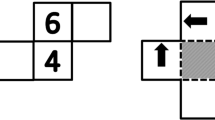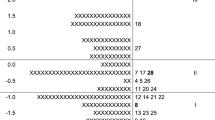Abstract
The objectives of the current study were (a) to develop a measure of children's analogical thinking modifiability (CATM) based on the Feuerstein, Rand, and Hoffman (1979) theory of dynamic assessment of cognitive modifiability, (b) to compare the performance of groups assumed to be differentially modified by intervention, (c) to compare CATM performance with performance on a conventional test, and (d) to study qualitative changes after a learning process. Subjects were disdvantaged, regular, and special education kindergarten children (N=140), and mentally retarded children (N=20). The CATM was administered together with the Ravens Colored Progressive Matrices (RCPM) in a balanced order. Disadvantaged and regular children achieved higher gain scores than other groups in both none-or-all and partial credit methods (p < 01). The MR and the special education groups showed small gains according to the none-or-all credit method; however, according to the partial credit method, the MR group showed high gains and the special education group a performance decrease. Performance scores on the CATM were higher than on the RCPM, especially in comparison to the B8-B12 items-differences reach a peak of 61% and 67% for the disadvantaged and regular groups, respectively. Qualitative analysis indicated that form mistakes were most resistant to change, whereas color mistakes were most easy to modify. Results were explained within Feuerstein's theoretical framework of cognitive modifiability. Impaired cognitive functions as well as analytic versus synthetic processes were suggested to explain group differences.
Similar content being viewed by others
References
Budoff (1967). Learning potential among institutionalized retardates.American Journal of Mental Deficiency, 72, 404–411.
Feuerstein, R., Miller, R., Rand, Y., & Jensen, H. R. (1981). Can evolving techniques better measure cognitive change?Journal of Special Education, 15, 201–219.
Feuerstein, R., & Rand, Y. (1974). Mediated learning experiences: An outline of the proximal etiology for differential development of cognitive functions. In L. Gold Fein (Ed.),International understanding: Cultural differences in the development of cognitive processes (pp. 7–37).
Feuerstein, R., Rand, Y., & Hoffman, M. B. (1979).The dynamic assessment of retarded performers. Baltimore: University Park Press.
Jedrysek, E., Klapper, A., Pope, L., & Wortis, J. (1972).Psychoeducational evaluation of the preschool child. New York: Grune and Stratton.
Jensen, A. (1969). How much can we boost IQ and scholastic achievement?Harvard Educational Review, 39, 1–123.
Lambert, N. M., Wilcox, M. R., & Gleason, W. P. (1974).The educationally retarded child. New York: Grune and Stratton.
Raven, J. C. (1965).Guide to using the Colored Progressive Matrices, Sets A, Ab, and B. London: H. K. Lewis.
Stott, D. H. (1978).The hard-to-teach child. Baltimore: University Park Press.
Author information
Authors and Affiliations
Additional information
This research was supported in part by the Internal Research Fund, Bar-Ilan University. We wish to express our appreciation to the children and their teachers for their participation, to Frida Spanier for teaching and data collection, and to Steve Greenwald for data analysis.
Rights and permissions
About this article
Cite this article
Tzuriel, D., Klein, P.S. The assessment of analogical thinking modifiability among regular, special education, disadvantaged, and mentally retarded children. J Abnorm Child Psychol 13, 539–552 (1985). https://doi.org/10.1007/BF00923140
Revised:
Issue Date:
DOI: https://doi.org/10.1007/BF00923140




